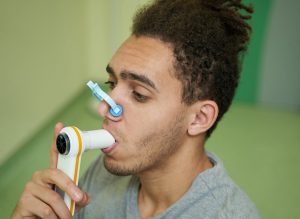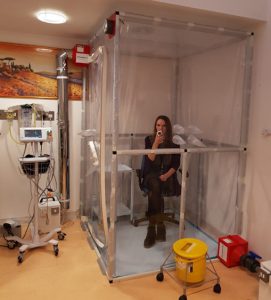TBVAC-HORIZON has met an important milestone: On 3 April 2024, the first participant in the UOXF “TB46” study was enrolled.
Tuberculosis (TB) remains one of the most devastating infectious diseases worldwide, killing over 4,000 people every day. Prevention of TB infection by novel vaccines would provide the most cost-effective approach to achieve the goals of the WHO’s End TB strategy and the UN’s Sustainable Development Goals. While there are few promising TB vaccine candidates available, innovation by new platforms and strategies is needed to ensure that the most effective and affordable vaccines are developed.
The Horizon Europe-funded project TBVAC-HORIZON will improve understanding of lung immunity in tuberculosis in order to establish a diverse and innovative global TB vaccine pipeline targeting mucosal immunity.
One of the objectives is to evaluate whether mucosal revaccination with BCG (the current and only licensed vaccine against TB) improves protective efficacy against infection with Mtb in aligned studies with humans, non-human primates and small animals (mice). The Oxford study will compare whether administering BCG via an inhaled (lung) route stimulates a stronger and better immune response than administering it under the skin (the conventional, intradermal route). As the natural route of infection with TB is through inhalation of droplets into the lungs, this approach is thought to be better at stimulating the immune system. Also it will be compared whether adminstration of BCG intradermally to individuals with Type 2 Diabetes will stimulate as strong an immune response as in healthy persons without Diabetes. This is an important aspect as people with diabetes are more likely to develop TB disease as well as develop complications from it: Better understanding of the immune response to BCG in immunocompromised individuals is urgently needed.
In this study, BCG will be administered for a second time to persons vaccinated with BCG once before. In total, 36 healthy volunteers aged between 18 and 65 will be recruited (of which 12 with type 2 Diabetes), and divided in 3 groups of 12 participants. The study is planned for 24 months, and its results are expected by the end of TBVAC-HORIZON in 2027.
Pict. 1 Breathing into a lung function machine. Lung function tests are done at the screening visit and after BCG vaccination
Pict. 2 Volunteer receiving aerosol BCG vaccination in a negative pressure tent



